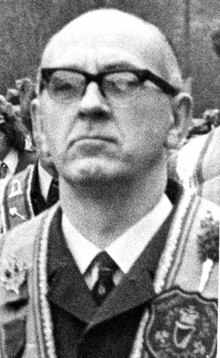William McGrath (loyalist)
| William McGrath | |
|---|---|

William McGrath at an Orange walk
|
|
| Born |
11 December 1916 Belfast, Northern Ireland |
| Died | 1991 or 1992 |
| Nationality | British |
| Other names | "The Beast of Kincora" |
| Occupation | Preacher housemaster |
| Employer | Kincora Boys' Home |
| Organization | Orange Order |
| Known for |
Loyalist and anti-Catholic activist Serial paedophile |
| Political party | Ulster Unionist Party |
| Movement |
Tara Ulster Constitution Defence Committee |
| Criminal charge | Gross indecency, buggery, indecent assault |
| Criminal penalty | Four years imprisonment |
| Spouse(s) | Kathleen |
| Children | Worthington, Harvey Andrew, Elizabeth Jean Frances |
William McGrath (11 December 1916 – 1992) was a loyalist from Northern Ireland who founded the far-right organisation Tara in the 1960s, having also been prominent in the Orange Order until his expulsion due to his paedophilia. A house master in Kincora Boys' Home in East Belfast, in 1981 he was jailed for four years for paedophile activities at the Home.
McGrath was born on 11 December 1916 to a Methodist family living in Earl Street in the Sailortown area of Belfast. McGrath married his English-born wife Kathleen, who served at the nearby Worldwide Evangelisation Crusade, and the two set up home on the Antrim Road before moving to Finaghy. He was a member of the Orange Order and for a time acted as chaplain to the prestigious Fernhill Orange Lodge. McGrath was also a branch member of the Ulster Unionist Party and for a time a delegate to the party, although he did not take a prominent role in party politics.
Their house in Finaghy, a large mansion, was named Faith House and became the centre for the Christian Fellowship and Irish Emancipation Centre which they established in 1941, with rooms made available for young people to stay. McGrath travelled widely throughout Northern Ireland preaching his religious message, which included hard-line Ulster loyalist principles. McGrath claimed that Northern Ireland was on the verge of chaos and blamed it on the Irish Republican Army's supposed turn to communism, which he saw as the enemy of Christianity. According to the Royal Ulster Constabulary (RUC), as part of his virulent anti-communism, McGrath made contact with clandestine religious groups in Eastern Europe and smuggled in Bibles and religious tracts for their use.
...
Wikipedia
